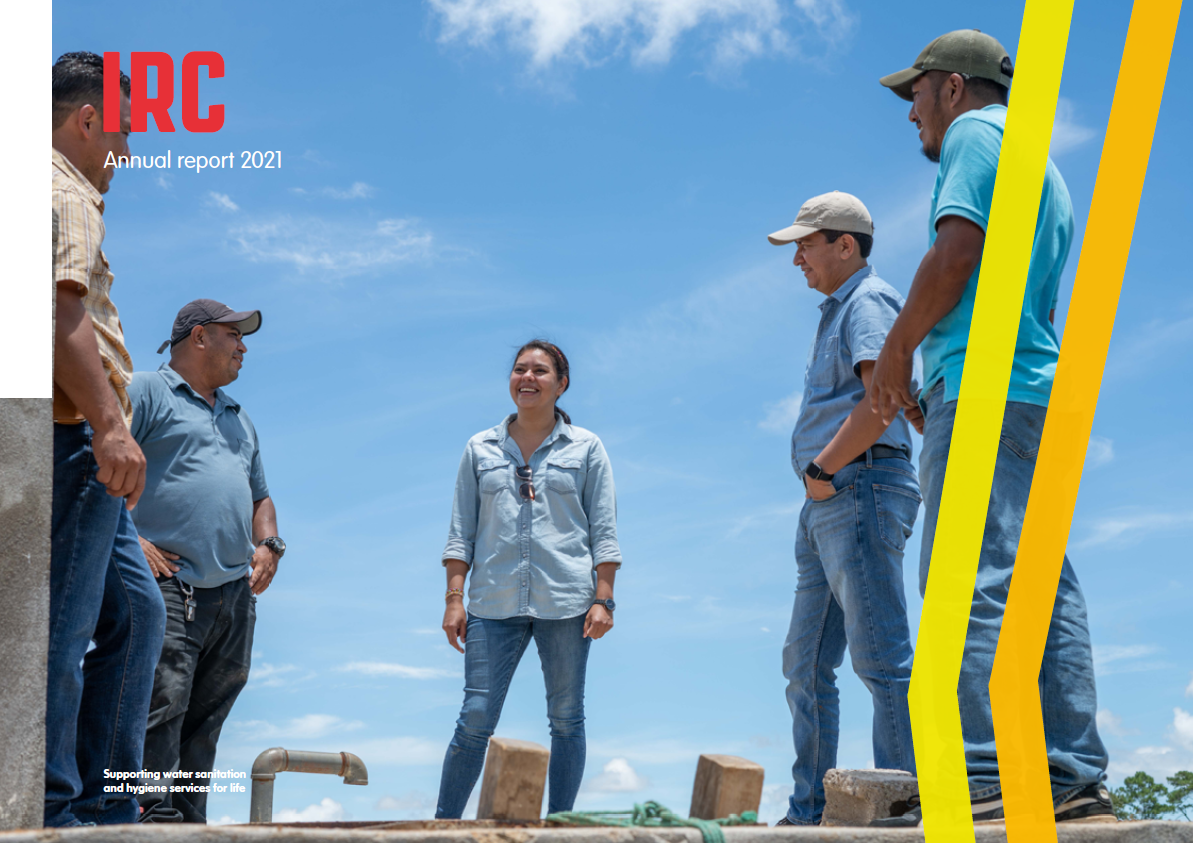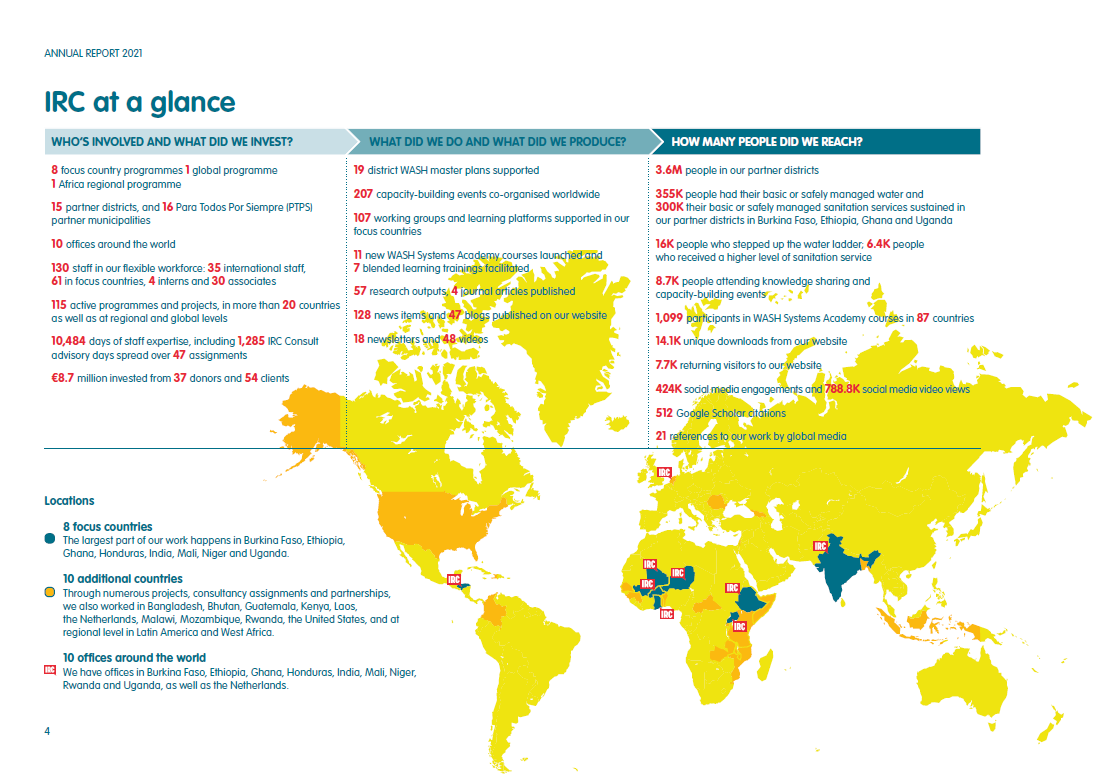IRC is all about partnership for impact and 2021 saw us create exciting new partnerships and consolidate existing ones
Published on: 29/06/2022

2021 was the final year of our medium-term strategic plan (2017-21), and we ended it on an upbeat note when, in August, we cemented our Alliance with Water For People and launched our visionary Destination 2030 Strategy. The vision is clear: the passionate pursuit of sustainable water, sanitation, and hygiene (WASH) services for all. Working together to drive exponential progress in the delivery of WASH, and guided by our shared Destination 2030 Strategy, we will serve 20 million, reach 200 million and change the system. By 2030 we will have radically increased our impact while tripling the annual investment in water and sanitation systems.
Destination 2030 is all about a shared commitment to scale, impact and change, with the delivery of services to everyone in our partner districts at its heart. Four years after launching the first district 'master plan' (in Asutifi North, Ghana, in March 2018) we continue to see the results that come from empowered local leadership and collective action around a shared vision of access for all. That original master plan has now been joined by 18 others, of which six were finalised, validated and approved by district leadership in 2021.
In Niger, our two partner districts are the only ones – out of 266 communes – to have master plans. Regular service level monitoring means that these district governments are also the only ones to base their decisions on accurate knowledge of WASH service levels in local health centres and schools. In Ghana, the work of implementing the master plan in Asutifi North district has led to the creation of the National Development Planning Commission's WASH Toolkit for the sector. And some districts, like Asutifi North, are on track to reach their entire population with safe water services by 2030. Other areas, like Burkina Faso, Mali and Niger, are faced with continuous security challenges, and partners in these areas need to find new ways of working. In 2021, IRC and its partners started using Geographic Information Systems (GIS) to pinpoint the location of vulnerable populations and identify ways to reach them.
The move towards more professionally managed rural water supplies continues. 2021 was also the year where we showed how important it is to deepen our relationships with utilities, in rural as well as urban areas. Professionally managed water services can contribute to overcoming common challenges related to rural water service provision, including low management capacity and performance of service providers, in order to ensure sustainable basic, and where possible, safely managed water services.
For example, in Uganda we formed a tri-partite partnership with the National Water and Sewerage Corporation and Kabarole District Local Government to extend a piped water system network to ensure 100% sustainable access to the 12,800 people living in Kabende sub-county. We also worked on influencing Burkina Faso's national utility, ONEA, to increase its focus on reaching people in small towns. This will include services for 10,000 people.
Our new Partnership for WASH Systems in Africa with UNICEF and Water For People is strengthening national WASH systems in 19 countries in Africa. We do this by improving sector capacities, and knowledge management, advocating for systems change at national and regional levels and providing technical assistance in WASH systems strengthening to UNICEF country offices. An important part of this has been updating UNICEF's systems and finance courses on the Agora training platform together with our WASH Systems Academy.
This year, our WASH Systems Academy had 1,066 participants with 1,404 enrolments and 483 certificates. In Ethiopia we used the online WASH Systems Academy, together with in-person workshops, to tailor the course to the local context.
Public Development Banks are central to improving the financing of the water and sanitation sector, and it is only when the sector is strong that we can achieve SDG 6, the Paris Agreement objectives and enhance biodiversity protection. Building on studies conducted as part of our consultancy work, the Agence Française de Développement (AFD) launched a Water Finance Coalition of Public Development Banks. IRC acts as the Secretariat of the coalition.
We also contributed to other partnerships, networks and global platforms including Agenda for Change, Millennium Water Alliance, Netherlands Water Partnership NGO Platform, Rural Water Supply Network, Sanitation and Water for All (SWA), UN Water and Water Integrity Network. This included supporting the leadership of Agenda for Change to change its governance to one that puts country collaborations at the centre.
As in every year, we faced challenges. Covid-19 tested our ability to work through sporadic lockdowns, while political conflict in many of our focus countries tested the resolve of our teams and the incremental improvement that lies at the heart of our systems strengthening approach.
The world is not on track to deliver its 2030 goals for safe and sustainable drinking water and sanitation services to everyone. Efforts are confronted by a lack of high-level political vision and leadership in many countries. There are too few Swachh Bharats or Jal Jeevans, and too many countries and actors that still see providing a shared handpump or pit latrine as appropriate goals. They are not! Scaling the successes we've seen in our partner districts, especially the expansion of professionally and safely managed services, requires clear and strong political commitment not just to systems strengthening – but to profound systems change.
Triggering and supporting this change is at the heart of Destination 2030. It is also the reason for our continued support to key partnerships like Agenda for Change and Sanitation and Water for All. In order to widen and reinforce the network of likeminded partners committed to this change, we will host signature events in 2022 and 2023: All Systems Go Africa in Ghana in October 2022, and All Systems Connect in the Netherlands in May 2023. We hope you'll join us.
Read our Annual Report 2021, our Monitoring Report 2021 and our 2021 Financial Report for more highlights and details of our work.
